Student Research Proposal: Cognitive Psychology, August 2017
VerifiedAdded on 2023/01/10
|7
|1789
|47
Homework Assignment
AI Summary
This document is a student's research proposal for an MSc in Cognitive Psychology, focusing on the impact of music on information processing and learning. The proposal outlines the research question, literature review, aim, justification, and experimental design, which involves a 2x2 between-subjects design. The independent variables are processing depth (deep vs. shallow) and music presence (listening vs. no music), with information processing time as the dependent variable. The proposal also includes ethical considerations, participant demographics, recruitment methods, and sample size determination. The student addresses key ethical questions, providing justifications for any 'yes' answers, and includes a declaration regarding data collection from human participants. The proposal adheres to Arden University's ethical guidelines and includes sections on student and program details, along with a research ethics checklist. The student has also included details of the materials and apparatus required for the experiment, which is to be a quantitative study involving human participants. The proposal is designed to be submitted to the MSc Cognitive Psychology module tutors for review and feedback.
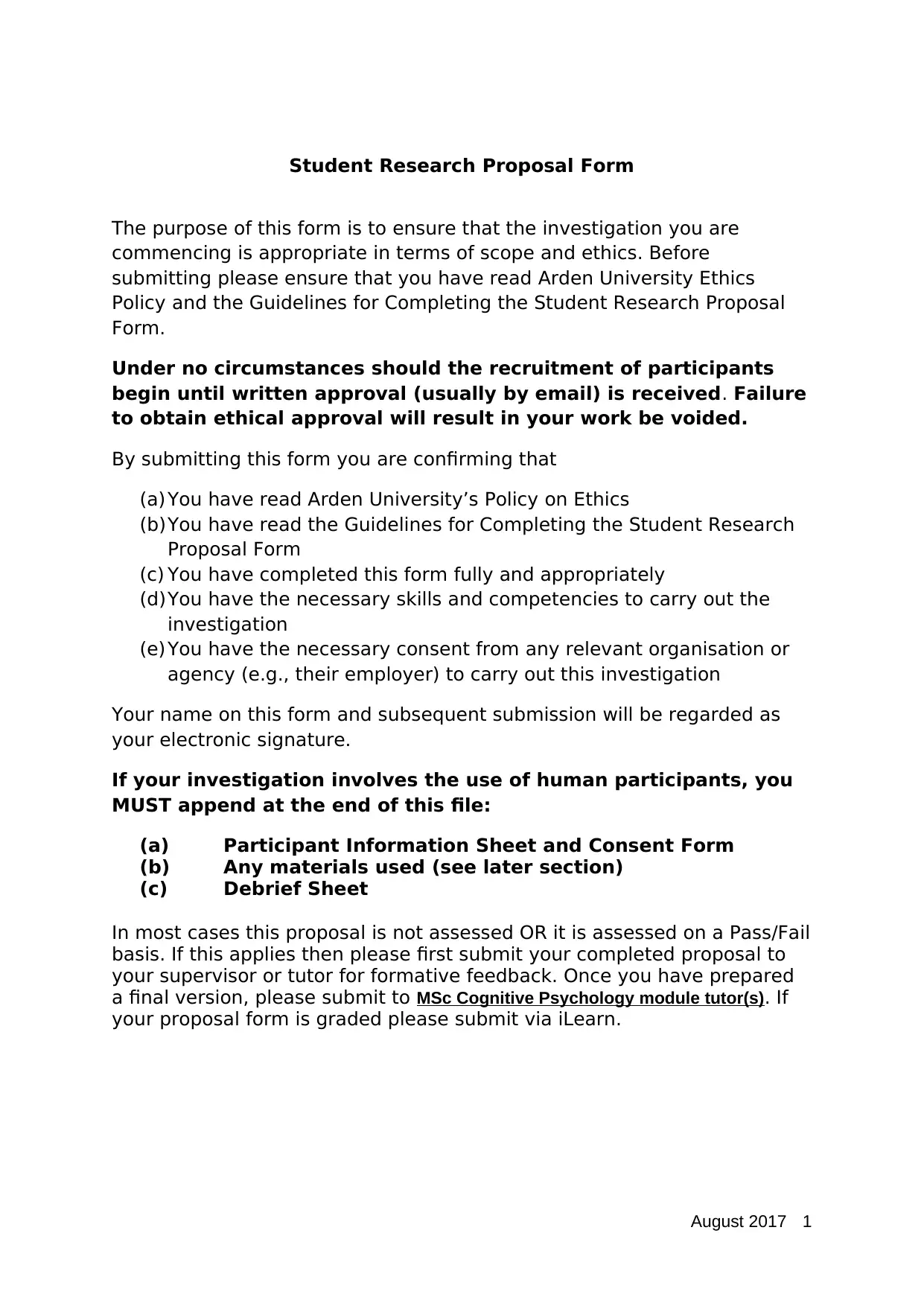
Student Research Proposal Form
The purpose of this form is to ensure that the investigation you are
commencing is appropriate in terms of scope and ethics. Before
submitting please ensure that you have read Arden University Ethics
Policy and the Guidelines for Completing the Student Research Proposal
Form.
Under no circumstances should the recruitment of participants
begin until written approval (usually by email) is received. Failure
to obtain ethical approval will result in your work be voided.
By submitting this form you are confirming that
(a) You have read Arden University’s Policy on Ethics
(b)You have read the Guidelines for Completing the Student Research
Proposal Form
(c) You have completed this form fully and appropriately
(d)You have the necessary skills and competencies to carry out the
investigation
(e) You have the necessary consent from any relevant organisation or
agency (e.g., their employer) to carry out this investigation
Your name on this form and subsequent submission will be regarded as
your electronic signature.
If your investigation involves the use of human participants, you
MUST append at the end of this file:
(a) Participant Information Sheet and Consent Form
(b) Any materials used (see later section)
(c) Debrief Sheet
In most cases this proposal is not assessed OR it is assessed on a Pass/Fail
basis. If this applies then please first submit your completed proposal to
your supervisor or tutor for formative feedback. Once you have prepared
a final version, please submit to MSc Cognitive Psychology module tutor(s). If
your proposal form is graded please submit via iLearn.
August 2017 1
The purpose of this form is to ensure that the investigation you are
commencing is appropriate in terms of scope and ethics. Before
submitting please ensure that you have read Arden University Ethics
Policy and the Guidelines for Completing the Student Research Proposal
Form.
Under no circumstances should the recruitment of participants
begin until written approval (usually by email) is received. Failure
to obtain ethical approval will result in your work be voided.
By submitting this form you are confirming that
(a) You have read Arden University’s Policy on Ethics
(b)You have read the Guidelines for Completing the Student Research
Proposal Form
(c) You have completed this form fully and appropriately
(d)You have the necessary skills and competencies to carry out the
investigation
(e) You have the necessary consent from any relevant organisation or
agency (e.g., their employer) to carry out this investigation
Your name on this form and subsequent submission will be regarded as
your electronic signature.
If your investigation involves the use of human participants, you
MUST append at the end of this file:
(a) Participant Information Sheet and Consent Form
(b) Any materials used (see later section)
(c) Debrief Sheet
In most cases this proposal is not assessed OR it is assessed on a Pass/Fail
basis. If this applies then please first submit your completed proposal to
your supervisor or tutor for formative feedback. Once you have prepared
a final version, please submit to MSc Cognitive Psychology module tutor(s). If
your proposal form is graded please submit via iLearn.
August 2017 1
Paraphrase This Document
Need a fresh take? Get an instant paraphrase of this document with our AI Paraphraser
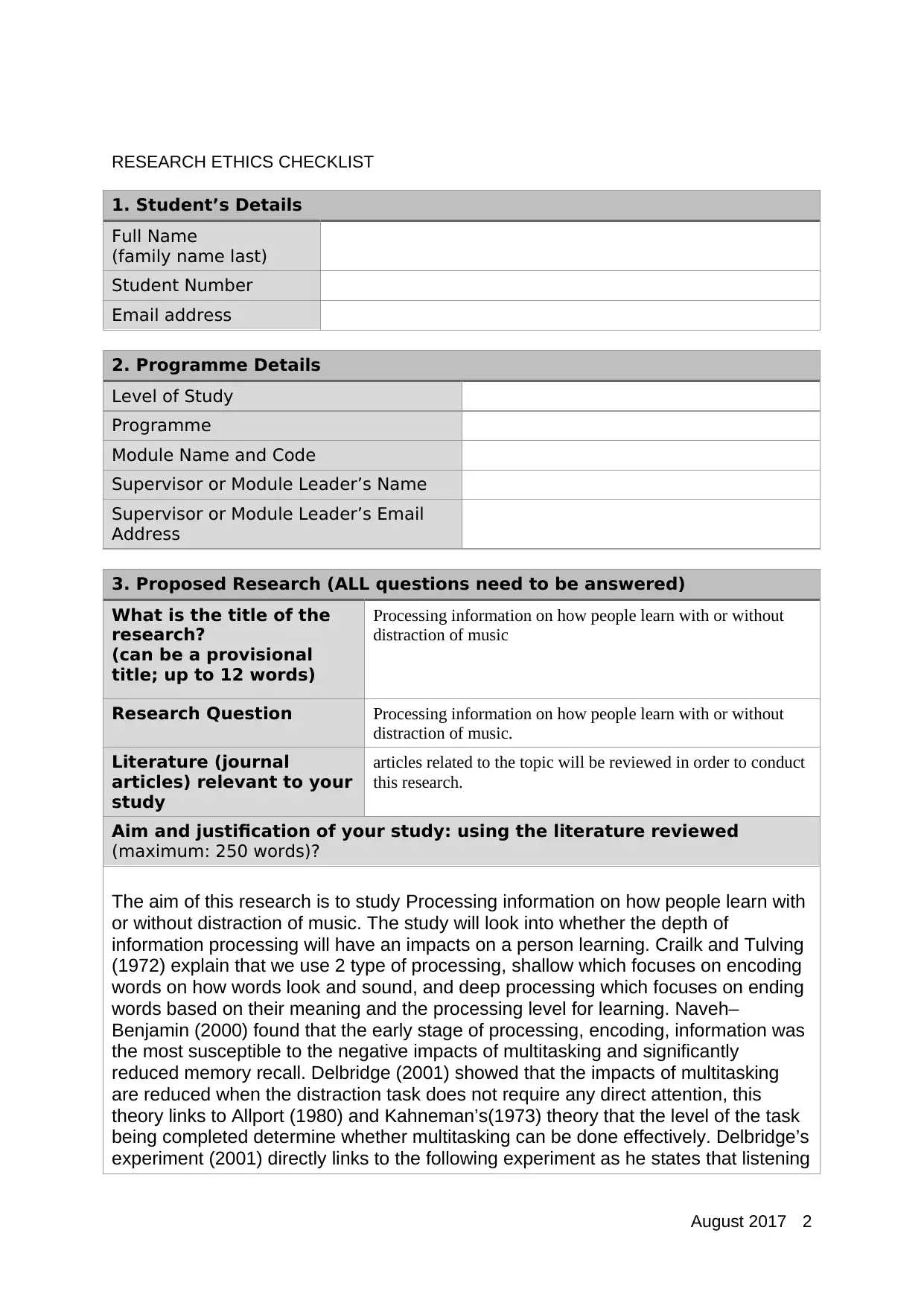
RESEARCH ETHICS CHECKLIST
1. Student’s Details
Full Name
(family name last)
Student Number
Email address
2. Programme Details
Level of Study
Programme
Module Name and Code
Supervisor or Module Leader’s Name
Supervisor or Module Leader’s Email
Address
3. Proposed Research (ALL questions need to be answered)
What is the title of the
research?
(can be a provisional
title; up to 12 words)
Processing information on how people learn with or without
distraction of music
Research Question Processing information on how people learn with or without
distraction of music.
Literature (journal
articles) relevant to your
study
articles related to the topic will be reviewed in order to conduct
this research.
Aim and justification of your study: using the literature reviewed
(maximum: 250 words)?
The aim of this research is to study Processing information on how people learn with
or without distraction of music. The study will look into whether the depth of
information processing will have an impacts on a person learning. Crailk and Tulving
(1972) explain that we use 2 type of processing, shallow which focuses on encoding
words on how words look and sound, and deep processing which focuses on ending
words based on their meaning and the processing level for learning. Naveh–
Benjamin (2000) found that the early stage of processing, encoding, information was
the most susceptible to the negative impacts of multitasking and significantly
reduced memory recall. Delbridge (2001) showed that the impacts of multitasking
are reduced when the distraction task does not require any direct attention, this
theory links to Allport (1980) and Kahneman’s(1973) theory that the level of the task
being completed determine whether multitasking can be done effectively. Delbridge’s
experiment (2001) directly links to the following experiment as he states that listening
August 2017 2
1. Student’s Details
Full Name
(family name last)
Student Number
Email address
2. Programme Details
Level of Study
Programme
Module Name and Code
Supervisor or Module Leader’s Name
Supervisor or Module Leader’s Email
Address
3. Proposed Research (ALL questions need to be answered)
What is the title of the
research?
(can be a provisional
title; up to 12 words)
Processing information on how people learn with or without
distraction of music
Research Question Processing information on how people learn with or without
distraction of music.
Literature (journal
articles) relevant to your
study
articles related to the topic will be reviewed in order to conduct
this research.
Aim and justification of your study: using the literature reviewed
(maximum: 250 words)?
The aim of this research is to study Processing information on how people learn with
or without distraction of music. The study will look into whether the depth of
information processing will have an impacts on a person learning. Crailk and Tulving
(1972) explain that we use 2 type of processing, shallow which focuses on encoding
words on how words look and sound, and deep processing which focuses on ending
words based on their meaning and the processing level for learning. Naveh–
Benjamin (2000) found that the early stage of processing, encoding, information was
the most susceptible to the negative impacts of multitasking and significantly
reduced memory recall. Delbridge (2001) showed that the impacts of multitasking
are reduced when the distraction task does not require any direct attention, this
theory links to Allport (1980) and Kahneman’s(1973) theory that the level of the task
being completed determine whether multitasking can be done effectively. Delbridge’s
experiment (2001) directly links to the following experiment as he states that listening
August 2017 2
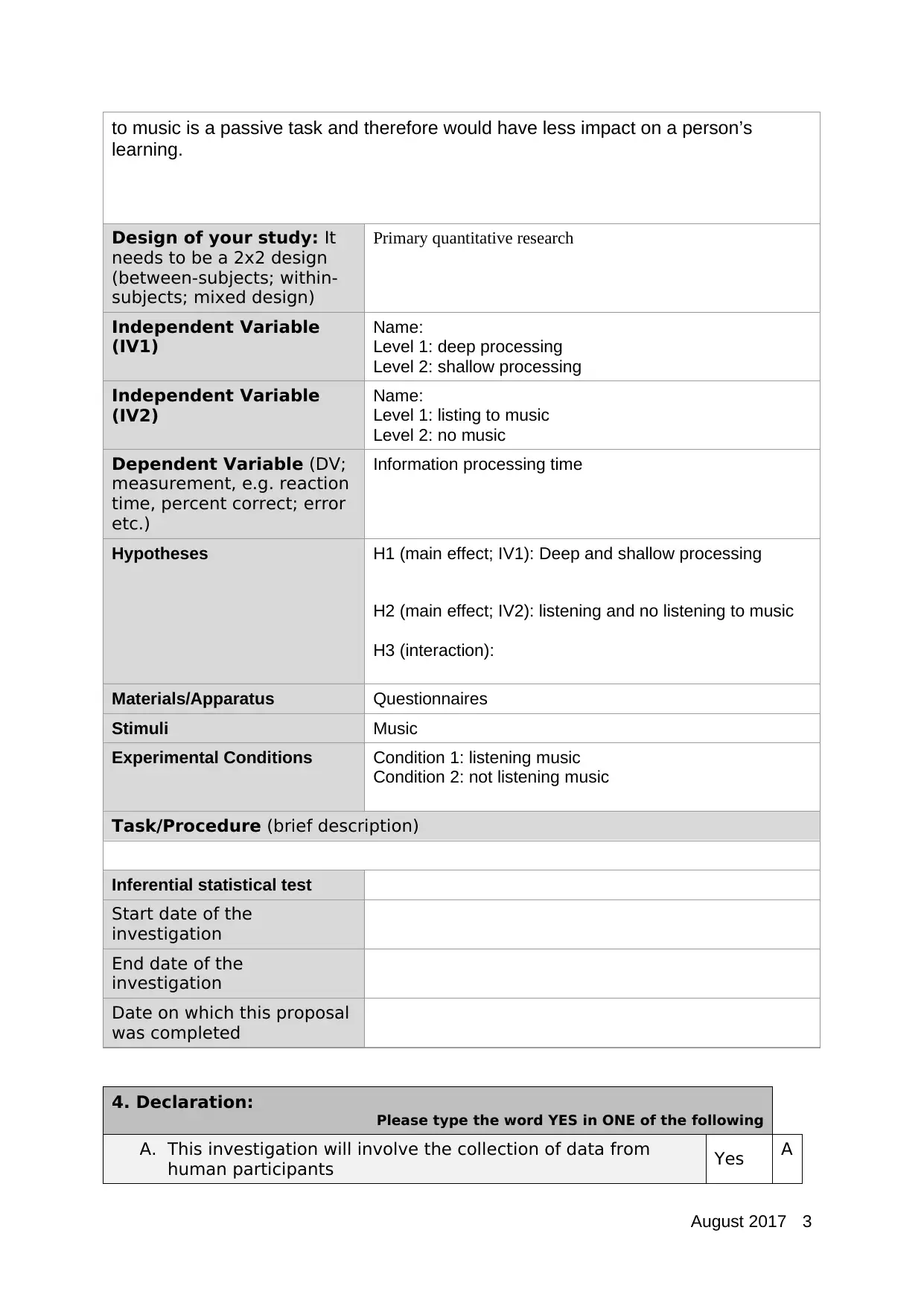
to music is a passive task and therefore would have less impact on a person’s
learning.
Design of your study: It
needs to be a 2x2 design
(between-subjects; within-
subjects; mixed design)
Primary quantitative research
Independent Variable
(IV1)
Name:
Level 1: deep processing
Level 2: shallow processing
Independent Variable
(IV2)
Name:
Level 1: listing to music
Level 2: no music
Dependent Variable (DV;
measurement, e.g. reaction
time, percent correct; error
etc.)
Information processing time
Hypotheses H1 (main effect; IV1): Deep and shallow processing
H2 (main effect; IV2): listening and no listening to music
H3 (interaction):
Materials/Apparatus Questionnaires
Stimuli Music
Experimental Conditions Condition 1: listening music
Condition 2: not listening music
Task/Procedure (brief description)
Inferential statistical test
Start date of the
investigation
End date of the
investigation
Date on which this proposal
was completed
4. Declaration: Please type the word YES in ONE of the following
A. This investigation will involve the collection of data from
human participants Yes A
August 2017 3
learning.
Design of your study: It
needs to be a 2x2 design
(between-subjects; within-
subjects; mixed design)
Primary quantitative research
Independent Variable
(IV1)
Name:
Level 1: deep processing
Level 2: shallow processing
Independent Variable
(IV2)
Name:
Level 1: listing to music
Level 2: no music
Dependent Variable (DV;
measurement, e.g. reaction
time, percent correct; error
etc.)
Information processing time
Hypotheses H1 (main effect; IV1): Deep and shallow processing
H2 (main effect; IV2): listening and no listening to music
H3 (interaction):
Materials/Apparatus Questionnaires
Stimuli Music
Experimental Conditions Condition 1: listening music
Condition 2: not listening music
Task/Procedure (brief description)
Inferential statistical test
Start date of the
investigation
End date of the
investigation
Date on which this proposal
was completed
4. Declaration: Please type the word YES in ONE of the following
A. This investigation will involve the collection of data from
human participants Yes A
August 2017 3
⊘ This is a preview!⊘
Do you want full access?
Subscribe today to unlock all pages.

Trusted by 1+ million students worldwide
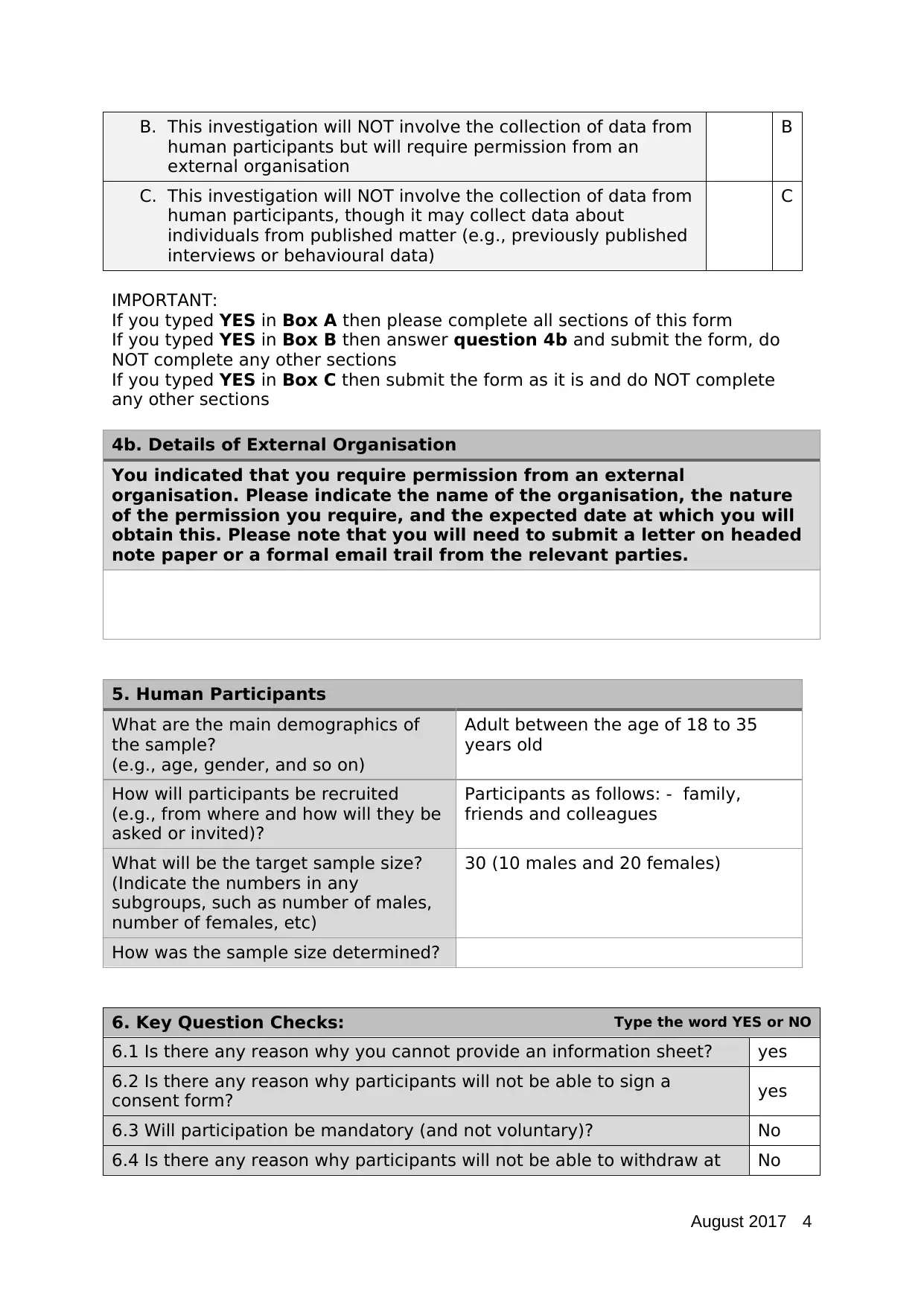
B. This investigation will NOT involve the collection of data from
human participants but will require permission from an
external organisation
B
C. This investigation will NOT involve the collection of data from
human participants, though it may collect data about
individuals from published matter (e.g., previously published
interviews or behavioural data)
C
IMPORTANT:
If you typed YES in Box A then please complete all sections of this form
If you typed YES in Box B then answer question 4b and submit the form, do
NOT complete any other sections
If you typed YES in Box C then submit the form as it is and do NOT complete
any other sections
4b. Details of External Organisation
You indicated that you require permission from an external
organisation. Please indicate the name of the organisation, the nature
of the permission you require, and the expected date at which you will
obtain this. Please note that you will need to submit a letter on headed
note paper or a formal email trail from the relevant parties.
5. Human Participants
What are the main demographics of
the sample?
(e.g., age, gender, and so on)
Adult between the age of 18 to 35
years old
How will participants be recruited
(e.g., from where and how will they be
asked or invited)?
Participants as follows: - family,
friends and colleagues
What will be the target sample size?
(Indicate the numbers in any
subgroups, such as number of males,
number of females, etc)
30 (10 males and 20 females)
How was the sample size determined?
6. Key Question Checks: Type the word YES or NO
6.1 Is there any reason why you cannot provide an information sheet? yes
6.2 Is there any reason why participants will not be able to sign a
consent form? yes
6.3 Will participation be mandatory (and not voluntary)? No
6.4 Is there any reason why participants will not be able to withdraw at No
August 2017 4
human participants but will require permission from an
external organisation
B
C. This investigation will NOT involve the collection of data from
human participants, though it may collect data about
individuals from published matter (e.g., previously published
interviews or behavioural data)
C
IMPORTANT:
If you typed YES in Box A then please complete all sections of this form
If you typed YES in Box B then answer question 4b and submit the form, do
NOT complete any other sections
If you typed YES in Box C then submit the form as it is and do NOT complete
any other sections
4b. Details of External Organisation
You indicated that you require permission from an external
organisation. Please indicate the name of the organisation, the nature
of the permission you require, and the expected date at which you will
obtain this. Please note that you will need to submit a letter on headed
note paper or a formal email trail from the relevant parties.
5. Human Participants
What are the main demographics of
the sample?
(e.g., age, gender, and so on)
Adult between the age of 18 to 35
years old
How will participants be recruited
(e.g., from where and how will they be
asked or invited)?
Participants as follows: - family,
friends and colleagues
What will be the target sample size?
(Indicate the numbers in any
subgroups, such as number of males,
number of females, etc)
30 (10 males and 20 females)
How was the sample size determined?
6. Key Question Checks: Type the word YES or NO
6.1 Is there any reason why you cannot provide an information sheet? yes
6.2 Is there any reason why participants will not be able to sign a
consent form? yes
6.3 Will participation be mandatory (and not voluntary)? No
6.4 Is there any reason why participants will not be able to withdraw at No
August 2017 4
Paraphrase This Document
Need a fresh take? Get an instant paraphrase of this document with our AI Paraphraser
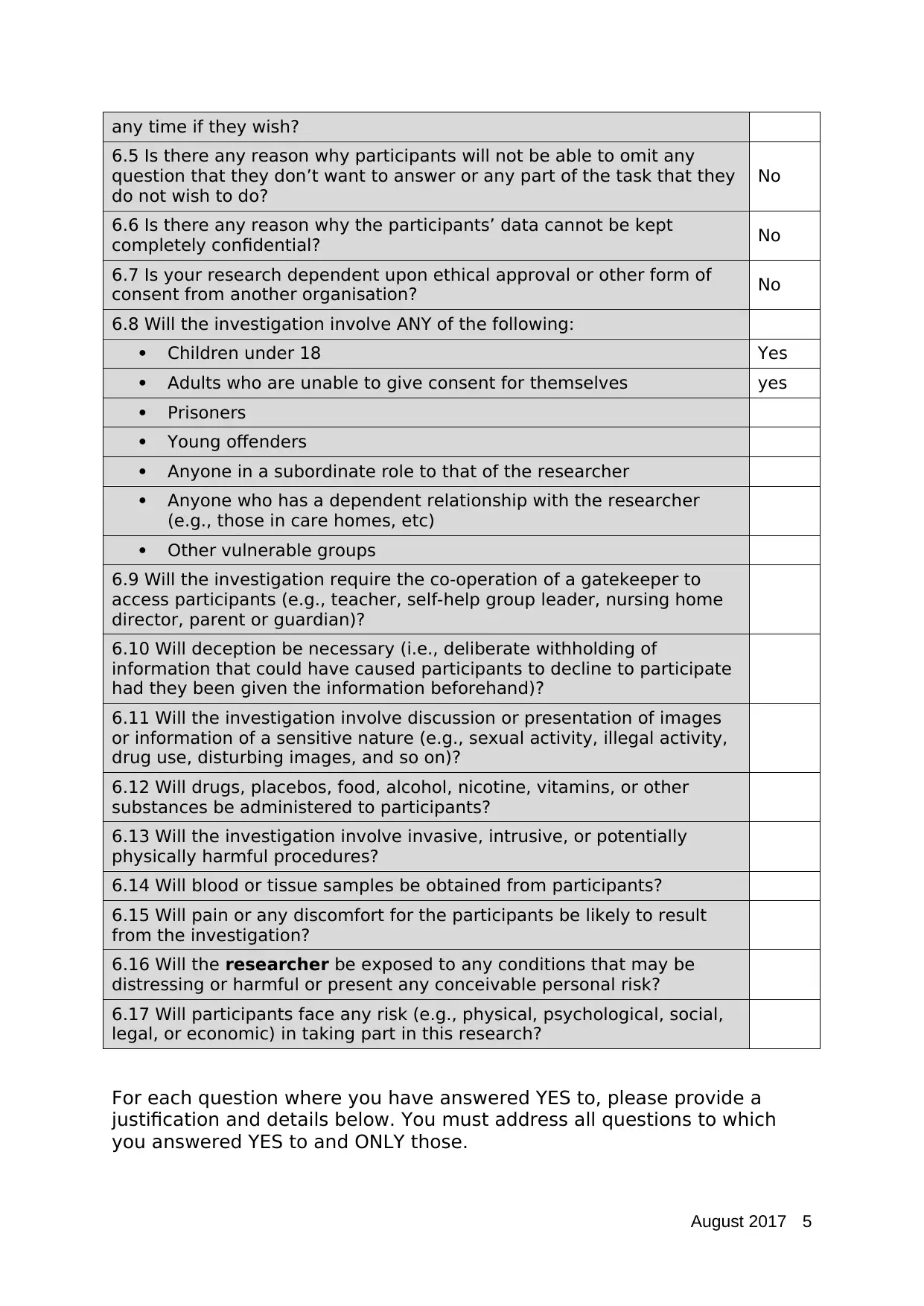
any time if they wish?
6.5 Is there any reason why participants will not be able to omit any
question that they don’t want to answer or any part of the task that they
do not wish to do?
No
6.6 Is there any reason why the participants’ data cannot be kept
completely confidential? No
6.7 Is your research dependent upon ethical approval or other form of
consent from another organisation? No
6.8 Will the investigation involve ANY of the following:
Children under 18 Yes
Adults who are unable to give consent for themselves yes
Prisoners
Young offenders
Anyone in a subordinate role to that of the researcher
Anyone who has a dependent relationship with the researcher
(e.g., those in care homes, etc)
Other vulnerable groups
6.9 Will the investigation require the co-operation of a gatekeeper to
access participants (e.g., teacher, self-help group leader, nursing home
director, parent or guardian)?
6.10 Will deception be necessary (i.e., deliberate withholding of
information that could have caused participants to decline to participate
had they been given the information beforehand)?
6.11 Will the investigation involve discussion or presentation of images
or information of a sensitive nature (e.g., sexual activity, illegal activity,
drug use, disturbing images, and so on)?
6.12 Will drugs, placebos, food, alcohol, nicotine, vitamins, or other
substances be administered to participants?
6.13 Will the investigation involve invasive, intrusive, or potentially
physically harmful procedures?
6.14 Will blood or tissue samples be obtained from participants?
6.15 Will pain or any discomfort for the participants be likely to result
from the investigation?
6.16 Will the researcher be exposed to any conditions that may be
distressing or harmful or present any conceivable personal risk?
6.17 Will participants face any risk (e.g., physical, psychological, social,
legal, or economic) in taking part in this research?
For each question where you have answered YES to, please provide a
justification and details below. You must address all questions to which
you answered YES to and ONLY those.
August 2017 5
6.5 Is there any reason why participants will not be able to omit any
question that they don’t want to answer or any part of the task that they
do not wish to do?
No
6.6 Is there any reason why the participants’ data cannot be kept
completely confidential? No
6.7 Is your research dependent upon ethical approval or other form of
consent from another organisation? No
6.8 Will the investigation involve ANY of the following:
Children under 18 Yes
Adults who are unable to give consent for themselves yes
Prisoners
Young offenders
Anyone in a subordinate role to that of the researcher
Anyone who has a dependent relationship with the researcher
(e.g., those in care homes, etc)
Other vulnerable groups
6.9 Will the investigation require the co-operation of a gatekeeper to
access participants (e.g., teacher, self-help group leader, nursing home
director, parent or guardian)?
6.10 Will deception be necessary (i.e., deliberate withholding of
information that could have caused participants to decline to participate
had they been given the information beforehand)?
6.11 Will the investigation involve discussion or presentation of images
or information of a sensitive nature (e.g., sexual activity, illegal activity,
drug use, disturbing images, and so on)?
6.12 Will drugs, placebos, food, alcohol, nicotine, vitamins, or other
substances be administered to participants?
6.13 Will the investigation involve invasive, intrusive, or potentially
physically harmful procedures?
6.14 Will blood or tissue samples be obtained from participants?
6.15 Will pain or any discomfort for the participants be likely to result
from the investigation?
6.16 Will the researcher be exposed to any conditions that may be
distressing or harmful or present any conceivable personal risk?
6.17 Will participants face any risk (e.g., physical, psychological, social,
legal, or economic) in taking part in this research?
For each question where you have answered YES to, please provide a
justification and details below. You must address all questions to which
you answered YES to and ONLY those.
August 2017 5
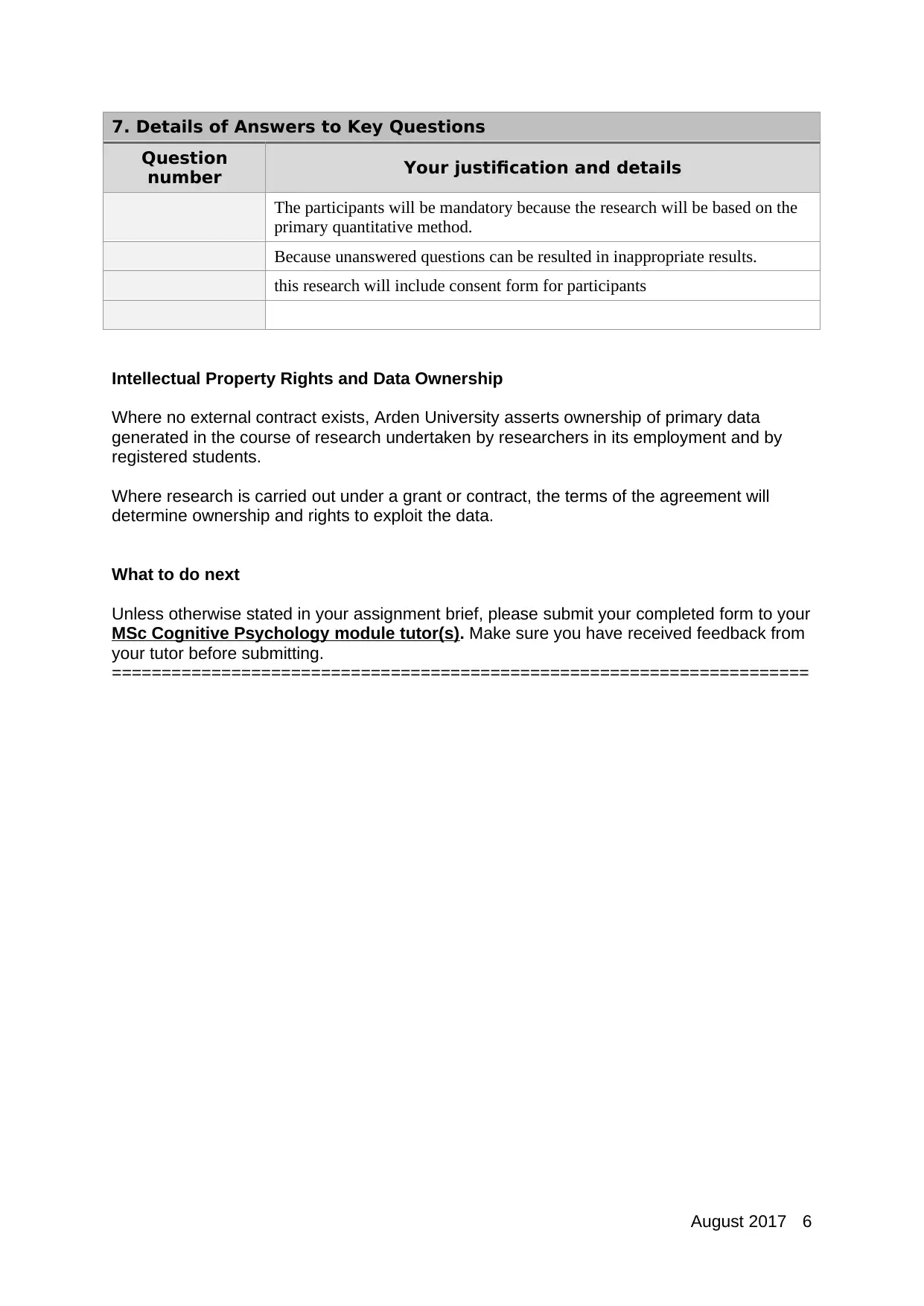
7. Details of Answers to Key Questions
Question
number Your justification and details
The participants will be mandatory because the research will be based on the
primary quantitative method.
Because unanswered questions can be resulted in inappropriate results.
this research will include consent form for participants
Intellectual Property Rights and Data Ownership
Where no external contract exists, Arden University asserts ownership of primary data
generated in the course of research undertaken by researchers in its employment and by
registered students.
Where research is carried out under a grant or contract, the terms of the agreement will
determine ownership and rights to exploit the data.
What to do next
Unless otherwise stated in your assignment brief, please submit your completed form to your
MSc Cognitive Psychology module tutor(s). Make sure you have received feedback from
your tutor before submitting.
======================================================================
August 2017 6
Question
number Your justification and details
The participants will be mandatory because the research will be based on the
primary quantitative method.
Because unanswered questions can be resulted in inappropriate results.
this research will include consent form for participants
Intellectual Property Rights and Data Ownership
Where no external contract exists, Arden University asserts ownership of primary data
generated in the course of research undertaken by researchers in its employment and by
registered students.
Where research is carried out under a grant or contract, the terms of the agreement will
determine ownership and rights to exploit the data.
What to do next
Unless otherwise stated in your assignment brief, please submit your completed form to your
MSc Cognitive Psychology module tutor(s). Make sure you have received feedback from
your tutor before submitting.
======================================================================
August 2017 6
⊘ This is a preview!⊘
Do you want full access?
Subscribe today to unlock all pages.

Trusted by 1+ million students worldwide

FOR TUTOR USE ONLY
Reviewer 1 Name
Reviewer 2 Name
Recommendation (Reject/ Approve / Go
to Panel)
Action
August 2017 7
Reviewer 1 Name
Reviewer 2 Name
Recommendation (Reject/ Approve / Go
to Panel)
Action
August 2017 7
1 out of 7
Related Documents
Your All-in-One AI-Powered Toolkit for Academic Success.
+13062052269
info@desklib.com
Available 24*7 on WhatsApp / Email
![[object Object]](/_next/static/media/star-bottom.7253800d.svg)
Unlock your academic potential
Copyright © 2020–2026 A2Z Services. All Rights Reserved. Developed and managed by ZUCOL.





